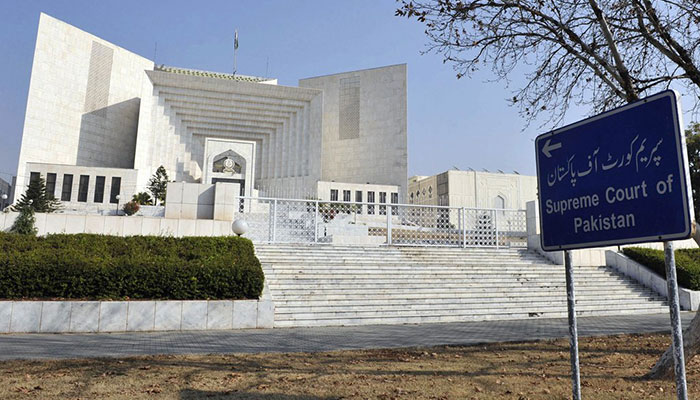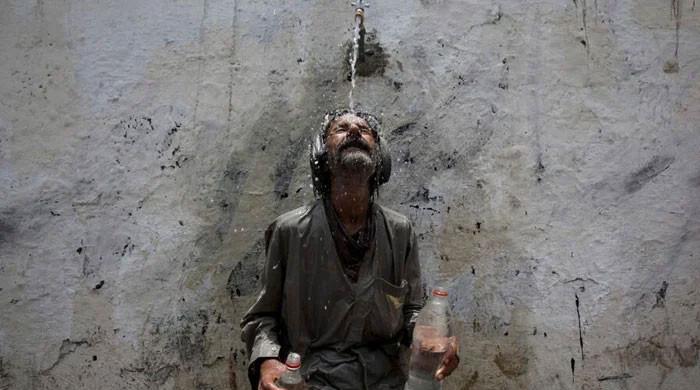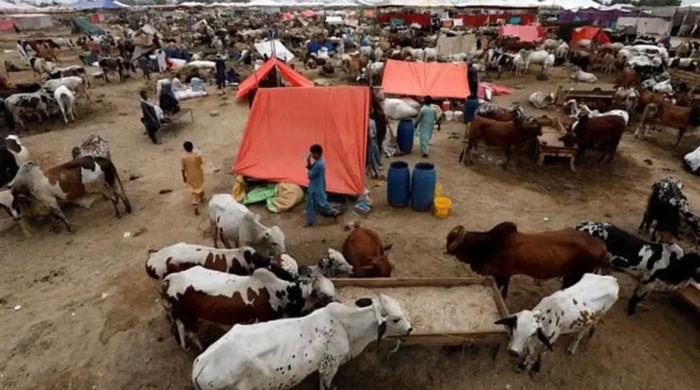Ensure availability of food, other essentials at quarantine centres, CJP Ahmed directs government
Sindh has submitted a comprehensive report to the court on steps taken to save people’s lives amid pandemic
April 20, 2020

ISLAMABAD: The Supreme Court (SC) of Pakistan on Monday held an hearing of a suo motu case related to the situation arising out of the coronavirus crisis and the steps being taken by the health authorities to curb the spread of the epidemic.
A five-member larger bench of the apex court — headed by Chief Justice of Pakistan (CJP) Gulzar Ahmed — heard the case. Justice Umar Ata Bandial, Justice Mazhar Alam Khan Miankhel, Justice Sajjad Ali Shah and Justice Qazi Muhammad Amin Ahmed were also on the bench.
NDMA, health department submit responses
In the hearing held today, the Attorney-General of Pakistan, Khalid Javed, told the court that the National Disaster Management Authority and the health department had submitted separate responses to court over the measures put in place to contain the spread of the virus.
"The Zakat department has not submitted a response," CJP Ahmed observed. "The queries of the court with regards to the matters of the Zakat department have been replied to only with references to certain laws," he added.
"The federal government gives the Zakat fund to the provinces. The provincial authorities are responsible for distributing the funds. A big chunk of the fund is spent on administrative matters," he added.
'Five hotels in Islamabad turned into quarantine centres'
"Five hotels in Islamabad have been turned into quarantine centres. Free virus services are being provided at Haji Camp and Pak-China Centre," Secretary Health Tanweer Qureshi told the court during the hearing.
"Ensure the availability of food and other essential services at the quarantine centres around the country," CJP Ahmed told the government officials present in the courtroom.
"The Taftan quarantine centre was a big nightmare. The government seems to be spending money, but it is not immediately clear where the money is being spent," CJP Ahmed noted.
SC expresses dissatisfaction with performance of authorities
During the last hearing, the apex court had expressed dissatisfaction on the performance of the authorities to deal with the ongoing health crisis and questioned credentials of Special Assistant to Prime Minister for Health Dr Zafar Mirza.
Read also: Sindh records highest daily coronavirus death toll
The apex court had also directed the federal government, as well as the provincial governments, Islamabad Capital Territory and Gilgit Baltistan, to take effective measures and formulate unified policies to deal with the pandemic and submit a comprehensive report on the next date of hearing.
CJP Ahmed had remarked that the government had not done anything at this point to stem the spread of the virus.
“There is an army of ministers and advisors in place but no work is being done,” CJP Ahmed observed. He also alleged that “corrupt people” have been kept as advisors in the government.
The bench also noted that there was no harmony and coordination among the provinces and the Centre to formulate a joint response.
Sindh submits report
Advocate General for Sindh Salman Talibuddin on Saturday submitted a comprehensive report to the Supreme Court explaining the steps taken by the provincial government to save people’s lives.
Defending the measures to seal off the 11 Union Committees of Karachi, the report said the affected areas will remain sealed off until the incubation period of the virus is over.
Read also: Timely action, large-scale testing best strategy to deal with coronavirus
The AG informed the SC that an isolation centre with a capacity of 1,200 patients has been established in the city with the help of Pakistan Army.
The report added that ration comprising 10kg flour, 5kg rice, 2kg sugar, 2kg pulses, tea, fresh fruits/vegetables, etc. was being provided at the doorstep of 154 families with coronavirus patients.
The Sindh government maintained that a transparent mechanism for the identification of needy families had been adopted in which public representatives were involved
Each ration bag, it added, provided for a family of 5-6 members for a period of 10 days at least and cost Rs2,000 per bag. The district administration has so far provided 13,000 bags in the entire district.
Since last Monday, the country has recorded nearly 3,000 cases of the virus.
As of today, Pakistan has reported more than 8,000 cases of the coronavirus and 167 deaths. Of the total infected, Punjab has the highest count — 3,822, whereas Sindh comes in second with 2,537.
A countrywide lockdown is being observed until April 30 to curb the spread of the virus.











